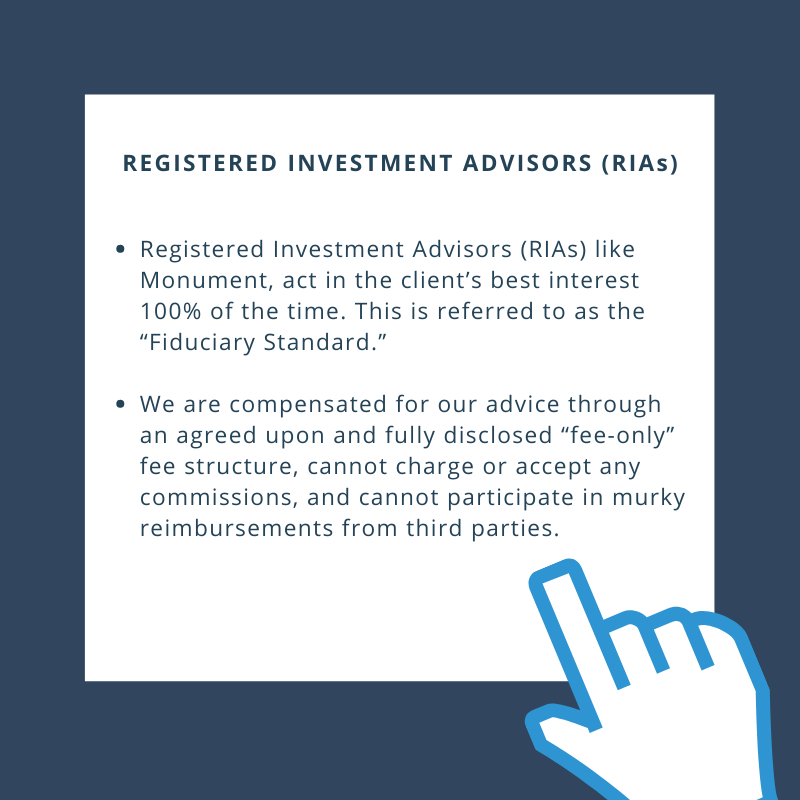Monument Wealth Management Articles
Financial Advisor vs. Fiduciary: Let’s Break It Down.

Share on your favorite platform, or by email
In an industry largely characterized by a lack of corporate accountability and conflicts of interest, we want to be the outspoken financial mavericks you can turn to for advice and straight-forward, unfiltered opinions. Really, we mean it.
And when it comes to effectively managing your finances, it’s critical to know not only the nitty-gritty details of wealth planning but also understand the basic principles the very industry was formed on. Because when it comes to your life savings, you should have confidence that your financial professional is responsible for acting in your best interest 24/7. Unfortunately, that’s not always the case.
Take a seat because here’s your first lesson: Financial advisor vs. fiduciary.
The Two “Hats” of Financial Advisors
There is no legal definition of “financial advisor” and that creates a big problem– when anyone can freely use the term, everyone inevitably will. Seriously, this is just like when everyone started putting “entrepreneur” in their bios and on their business cards. It’s important to keep this in mind when selecting a financial advisor because its very title doesn’t explicitly identify what ethical standards this advisor is operating within when they are advising their clients.
Yup, you read that correctly. There are two standards, the Fiduciary Standard and the Suitability Standard, that advisors can legally operate under. Simple enough, right? But (and this is a big but), the problem is that some brokerage firms don’t clarify which standard they are working within. This essentially allows them to jump from one to the other; putting on different ‘hats’ as they see fit for their clients and in some cases, their own personal agenda.
The Fiduciary Standard “Hat”
Registered Investment Advisors (RIAs) fall within a specific class of financial advisors who can provide clients with financial advice but must do so by abiding by their fiduciary duty. Under the Fiduciary Standard, an RIA’s fiduciary duty means that they are required to act in the client’s best interest 100% of the time. While you may encounter the occasional outlier who doesn’t always ferociously follow these guidelines, pure RIAs can and should only be wearing this one hat.

By definition, a fiduciary refers to a person or organization that acts on behalf of others to manage their assets responsibly, by placing a client’s best interest over their own. But, this is just the tip of the iceberg. At its core, being a fiduciary means being trustworthy, acting in good faith, and conducting yourself ethically and with integrity.
As 100% fee-only fiduciaries ourselves, we are compensated for our advice through an agreed-upon and fully disclosed “fee-only” structure. This means that we can’t charge or accept any commissions from specific investment products and are prohibited from participating in murky reimbursements from third parties. In fact, here at Monument, we no longer maintain the regulatory licenses needed to buy and sell securities for a commission.
By law, advisors operating under the Fiduciary Standard are obligated to abide by a duty of care and loyalty that constitute ethical and client-first advising enforced by the Securities and Exchange Commission (SEC). Remember, only pure RIAs can wear this hat and are paid for providing clients advice and will always put your best interests first. Score.
The Suitability Standard “Hat”
Some financial advisors are not required to act in a fiduciary capacity even though they hold themselves in the public as one. Like we said before when anyone can use the title ‘financial advisor’, everyone inevitably does.
These financial advisors, which include registered representatives of large Wall Street broker-dealer firms and insurance salesmen, are often paid commissions on their investment products because they can operate under what’s referred to as the Suitability Standard.
The Suitability Standard allows the financial advisor to sell investment products to clients so long as they are “suitable” for their client’s specific financial situation. In layman’s terms, these financial advisors aren’t required to act in a client’s best interest when recommending an investment product– they just merely need to ensure that the investment is suitable.
When this dilemma arises, it creates a conflict of interest because an advisor operating under the Suitability Standard can find several different suitable investments for a client and can ultimately choose the one that pays them the highest commission or fee. Oh, and here’s the kicker. They don’t have to disclose any of this information to you, the client. Pretty sly, right?
Acting in a client’s best interest would entail recommending not only a suitable investment but also selecting the best-priced investment that meets a specific goal, like income generation. For this reason, advisors operating under the Suitability Standard are ones to be wary of.
Beware of Multi-Hat Advising
Where investors (that’s you) can run into problems is when brokerage firms obfuscate this financial advisor vs. fiduciary issue by allowing their advisors to float back and forth between the two hats. These advisors are known as “hybrid advisors” and it can be challenging to know which hat they’re wearing at any given moment.
As the client, it’s incumbent that you prioritize your financial goals and ensure that your financial advisor is acting in your best interests, 100% of the time. Don’t be afraid to ask them which hat they’re wearing and disclose all compensation they are receiving from you, their own company, and any third parties. It’s your money and livelihood and you have the right to know how it’s being managed.
If you’re feeling unsure about your advisor’s answers, there is a way to obtain the paper trail. You can ask them for all sources of compensation by asking for a copy of Form ADV. This form is utilized by any financial advisor who recommends investments because it’s required in order for them to register their license with the SEC or the state where they do business. This form details the advisor’s fee schedule and any other form of compensation, such as receiving additional compensation for referring a client to a specific attorney or commission for selling a specific product.

Your Investments on Your Terms
Involving someone in your financial future requires a lot of trust. Because for you, your wealth represents so much more than a physical amount. It represents the blueprint for the life that you want to live.
Referring to what we design for our clients as an “investment plan” seems too common, too boring, too…average. To us, the term “investment planning” lacks the kind of ingenuity and imagination we think is imperative to the process. This is why we threw out this word from our vocabulary altogether and started specializing in a little something we like to call Private Wealth Design.
This premier service is a collaborative, creative, and customized approach to turning a wealth of diverse opinions, ideas, resources, and investments into a design that represents the life you want to live. And that’s just the beginning.
Your Private Wealth Design takes into consideration the big picture – in fact, it must. By definition, a design takes place prior to something being built. Our Private Wealth Design will show you how to meet your goals using what we know today all the while being flexible enough to adapt to the unforeseen changes of tomorrow. This actionable plan for your life, financial and otherwise, is designed around our core philosophy of leveraging patience, discipline, and time.
We know that involving someone in your financial future requires a lot of trust. Those of us at Monument will work every day to earn it. As 100% fee-only fiduciaries ourselves, we believe integrity and accountability should be the hallmarks of our work. For some wealth management firms, those words may be a slogan; for us, it’s our founding principle. That’s why our fiduciary duty isn’t a responsibility we run from; it’s one we proudly embrace.

Don’t miss our list of “10 Things All Investors Should Know”
Ready for straightforward, unfiltered opinion and tailored advice for YOUR questions, not everyone else’s?
IMPORTANT DISCLOSURE INFORMATION
Please remember that past performance is no guarantee of future results. Different types of investments involve varying degrees of risk, and there can be no assurance that the future performance of any specific investment, investment strategy, or product (including the investments and/or investment strategies recommended or undertaken by Monument Capital Management, LLC [“Monument”]), or any non-investment related content, made reference to directly or indirectly in this blog will be profitable, equal any corresponding indicated historical performance level(s), be suitable for your portfolio or individual situation, or prove successful. Due to various factors, including changing market conditions and/or applicable laws, the content may no longer be reflective of current opinions or positions. Moreover, you should not assume that any discussion or information contained in this blog serves as the receipt of, or as a substitute for, personalized investment advice from Monument. To the extent that a reader has any questions regarding the applicability of any specific issue discussed above to his/her individual situation, he/she is encouraged to consult with the professional advisor of his/her choosing. No amount of prior experience or success should be construed that a certain level of results or satisfaction will be achieved if Monument is engaged, or continues to be engaged, to provide investment advisory services. Monument is neither a law firm nor a certified public accounting firm and no portion of the blog content should be construed as legal or accounting advice.
A copy of Monument’s current written disclosure Brochure discussing our advisory services and fees is available for review upon request or at www.monumentwealthmanagement.com/disclosures. Please Note: Monument does not make any representations or warranties as to the accuracy, timeliness, suitability, completeness, or relevance of any information prepared by any unaffiliated third party, whether linked to Monument’s website or blog or incorporated herein, and takes no responsibility for any such content. All such information is provided solely for convenience purposes only and all users thereof should be guided accordingly.
Historical performance results for investment indices, benchmarks, and/or categories have been provided for general informational/comparison purposes only, and generally do not reflect the deduction of transaction and/or custodial charges, the deduction of an investment management fee, nor the impact of taxes, the incurrence of which would have the effect of decreasing historical performance results. It should not be assumed that your Monument account holdings correspond directly to any comparative indices or categories. Please Also Note: (1) performance results do not reflect the impact of taxes; (2) comparative benchmarks/indices may be more or less volatile than your Monument accounts; and, (3) a description of each comparative benchmark/index is available upon request.
Please Remember: If you are a Monument client, please contact Monument, in writing, if there are any changes in your personal/financial situation or investment objectives for the purpose of reviewing/evaluating/revising our previous recommendations and/or services, or if you would like to impose, add, or to modify any reasonable restrictions to our investment advisory services. Unless, and until, you notify us, in writing, to the contrary, we shall continue to provide services as we do currently. Please Also Remember to advise us if you have not been receiving account statements (at least quarterly) from the account custodian.
